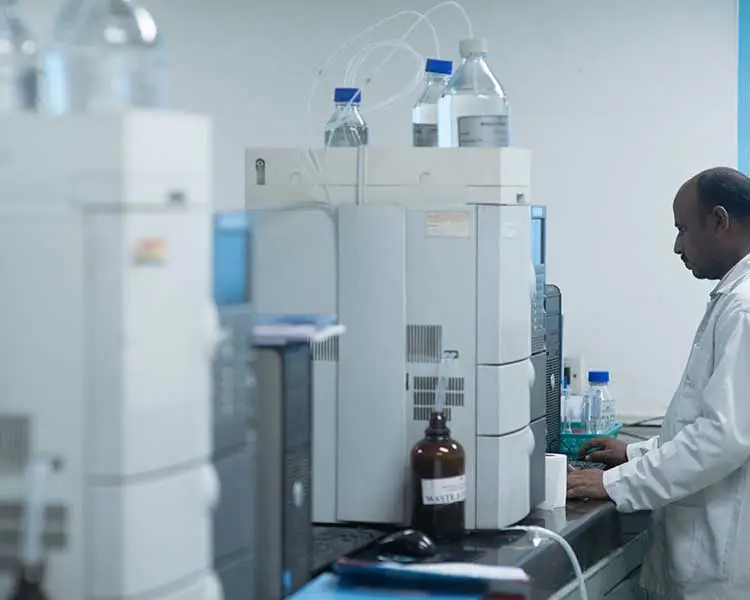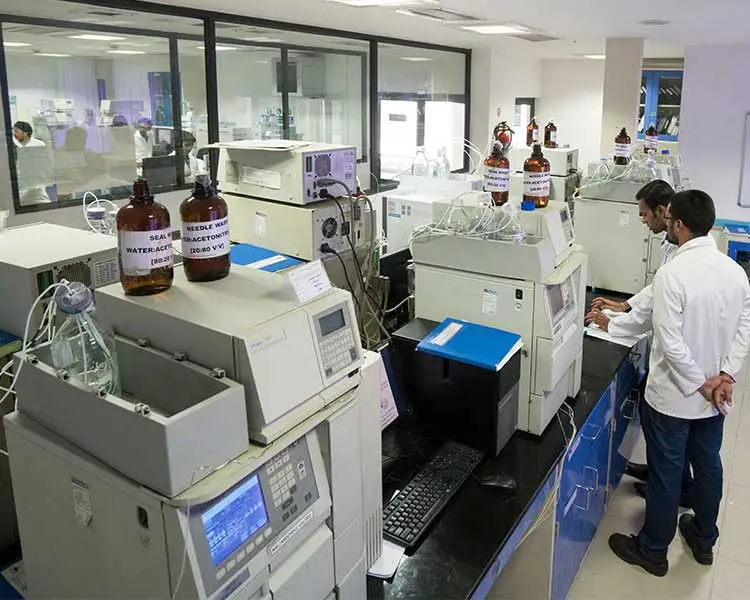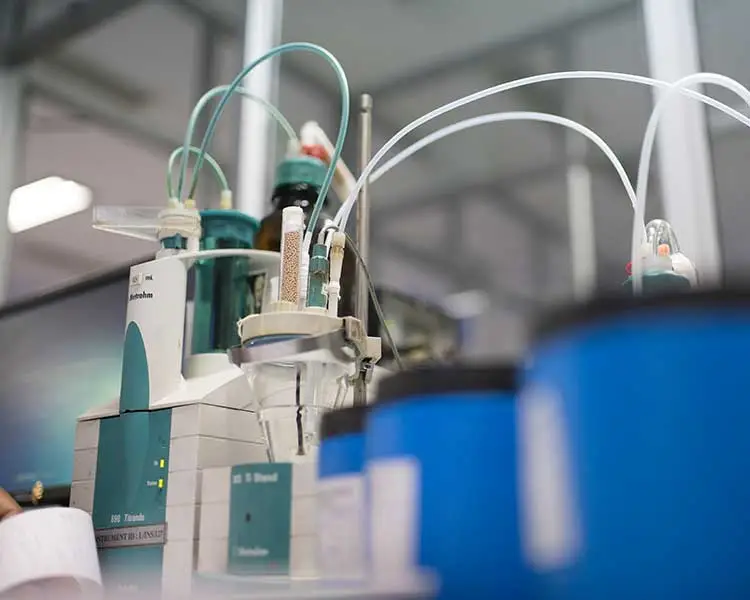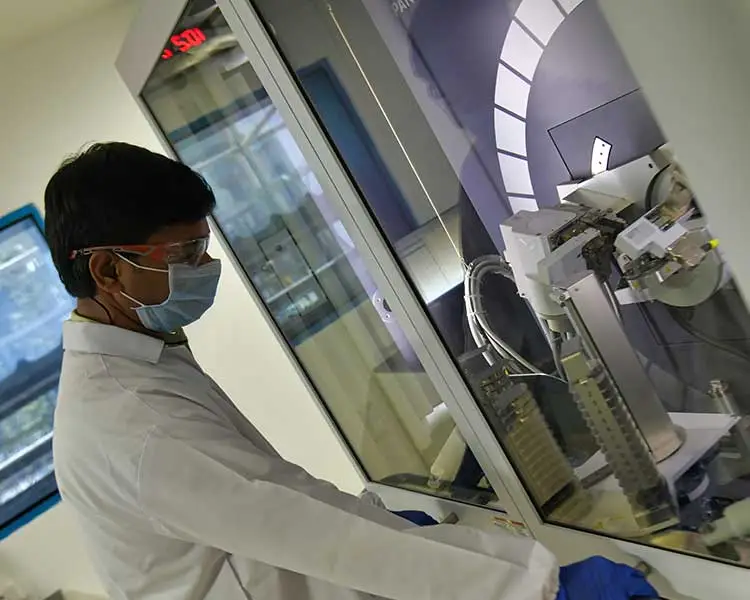It is essential that the drug substance is safe and effective for its intended use. Process optimization and validation play a pivotal role in ensuring its quality.

Process optimization
Process optimization focuses on enhancing the efficiency and atom economy at every stage of its development. Through analysis and redesigning of processes we eliminate unnecessary steps, reduce waste, and increase the overall output. A dedicated team continuously evaluates and improves processes using a data-driven approach and advanced technologies.
Process validation
Our quality assurance and validation team work together on data from the process design stage through to commercial production to ensure that manufacturing processes consistently deliver quality products from batch-to-batch and unit-to-unit. We adopt three key process validation stages:
The key to a robust process design is thorough appropriate documentation and evaluation. It consists of two elements: designing the facility and qualifying the equipment and utilities, as well as conducting process performance qualification (PPQ). We use DoE studies, risk analysis tools and verification runs at lab or pilot scale. Together these help us predict performance of commercial scale processes. The pilot plant consists of identically equipped manufacturing blocks and MOCs (Management of Change) which enable smooth tech transfer of molecules. We also provide a genotoxic impurity evaluation and nitrosamine impurity assessment to help customers right from the early phase of their project.
Process qualification assesses the data gathered from all relevant studies, including experiments, lab-, pilot- and commercial batches. Successful qualification demonstrates that commercial manufacturing processes will perform as expected.
We have systems in place to detect any nonconformities in processes enabling us to constantly improve or optimize strategies, even if this means additional regulatory approval or further process validation.


Technology transfer
Neuland has the scientific knowledge and technical support to ensure efficient and seamless tech transfer of products. We implement careful forward planning and execution to help avoid any unnecessary disruptions or delays. Our process involves a systematic approach that begins with a thorough evaluation of the technology to be transferred. This includes a comprehensive assessment of the existing manufacturing process, equipment, and quality control methods.
Neuland’s scientific and project management team works closely with customers to identify any potential gaps or challenges that may arise during the transfer process. We also provide regular updates, enabling collaborative manufacturing decisions for projects in the plant.
Quality by Design (QbD) and Design of Experiments
In the R&D laboratory, Neuland’s scientific team applies rigorous scientific and engineering tools and methodologies, using QbD principles, risk management strategies, and DoE software to understand and control processes. QbD applied to process development and scale-up focuses on five main issues: safety, quality, environment, health, and economics.
To support our QbD approach we have a Process Engineering (PE) Laboratory, equipped with state-of-the-art instrumentation and automation, and operated by highly qualified engineers and chemists trained in the best practices of QbD and DoE. We use Minitab and Design Expert as DoE software platforms. Based on experiments to identify the critical quality attributes (CQAs) of an API and the critical process parameters (CPPs), our scientists create a robust design space with flexibility built in to maximize accuracy and reproducibility on scale-up and transfer to a manufacturing facility.


Particle engineering
At Neuland, we understand the importance of API particle size towards product bioavailability, efficacy, and shelf-life. The process engineering team uses PAT tools to develop a robust process for API. We provide customers with comprehensive PSD, BD TBD and other relevant data required for pre-formulation studies.
Based on customers’ requirements, our particle engineering team performs milling and micronization studies and checks the impact on the PXRD and other physical and chemical properties. Other studies, such as exploration of different drying techniques, are part of the optimization plan. Temperature excursions studies for the drying period and RPM studies are performed to understand the impact on any polymorphs. Using microscopic images, crystal morphologies are studied during the process optimization phase.
FAQ's
At Neuland, process development begins in the R&D laboratory with the application of rigorous scientific and engineering tools and methodologies, using Quality by Design (QbD) principles, risk management strategies, and Design of Experiments (DoE) to understand and control processes.
Neuland Labs optimizes synthetic routes for APIs by thoroughly analyzing the drug’s chemistry at each step before designing an alternative, more efficient pathway. With synthetic route scouting, disciplines like medicinal, synthetic, and preparative chemistry are integrated to identify scalable and cost-effective solutions. This approach ensures that complex drug development processes are streamlined, enabling shorter, more practical synthetic routes for large-scale production.
Neuland Labs utilizes advanced R&D capabilities to ensure precision in chemistry and process development. Method validation, impurity profiling, and stability studies are conducted to optimize synthesis and enhance product quality. These are supported by analytical reference standards, ensuring robust quality control at every stage of development.
Neuland Labs integrates Green Chemistry by Design (GCbD) into process development, ensuring sustainability without compromising efficiency. By aligning with Quality by Design (QbD) principles, GCbD enhances API manufacturing through optimized synthetic routes, reduced environmental impact, and improved scalability. A robust sustainability framework guides efforts toward a low-carbon economy, responsible business practices, and community empowerment. With a seamless transition from process research to scalable green manufacturing, Neuland Labs remains committed to developing cost-effective and environmentally responsible solutions.
Neuland Labs ensures strict adherence to regulatory standards by following GLP, cGMP, and CMC regulatory requirements, enabling seamless market entry. Compliance is maintained through meticulous documentation, GMP adherence, and a robust Quality Management System (QMS) throughout the chemistry and process development. Regulatory guidelines from USFDA, EMA, and other global health authorities are integrated into every aspect of process development, from manufacturing practices to analytical validation and stability testing
Neuland Labs offers end-to-end custom chemical development, from molecule discovery to clinical development and commercial-scale supply with minimal tech transfer timelines. Expertise spans chemistry and process development, analytical testing, polymorph and salt screening, DoE studies, and QbD integration, ensuring efficiency at every stage. Additionally, CMC and regulatory support streamline biotech and pharmaceutical development, making Neuland a trusted CDMO partner for seamless chemical development and manufacturing
Yes, Neuland Labs ensures seamless process scale-up from clinical trials to commercial manufacturing, enabling efficient and scalable production at every stage of the product lifecycle.
Neuland Labs supports intellectual property protection in custom development projects through a dedicated IP rights group, regular audits and due diligence, infringement monitoring, and a robust E-Patent management system.
Neuland Labs serves the pharmaceutical and biotechnology industries, offering chemistry and process development services for APIs and intermediates, spanning from pre-IND to commercial manufacturing, with expertise in various therapeutic areas such as peptides, amino acid derivatives, and biochemicals.
To initiate a collaboration, either fill in your details at https://www.neulandlabs.com/en/contact-us so that the team can contact you directly or send an email at [email protected].



